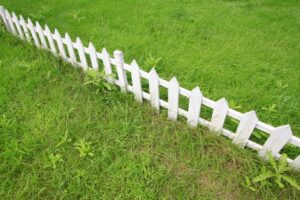Fence Tips: How to Keep Weeds off the Fence Line
Post holes for fencing can be dug anywhere from 18 to 36 inches deep; deeper for an extremely high fence. When a weed appears on a fence line, it is likely that the root system has already intertwined itself with the underground section of post. On electric fences, pesky weeds can short out the lines and cost thousands of dollars in repairs. There are several simple ways to take care of weeds before they become a serious problem, or to take care of them even if they are already a serious problem!
4 Ways to Keep Weeds Away from Your Fence Line
Chemical Sprays—the most widely used of these is glyphosate, which was introduced commercially as the active ingredient in Roundup in 1970. Its widespread use on crops over the last few decades have raised questions about its effect on humans. However, its effects on animals are negligible, and it is generally considered safe for use along property lines, even for homes with pets.
- Heat—yes, it’s exactly what it sounds like. Using a blowtorch (available in a range of sizes) attached to a propane tank, you can heat the weeds to about 2000 degrees Fahrenheit, effectively boiling the water in their cells and causing the cells to burst. It is best to water the soil around the problem area before you begin spraying. The moisture will conduct heat through the soil to seedlings that haven’t sprouted and kill some of them, preventing future growth.
- Vinegar—at $3 a bottle, white vinegar is the new go-to treatment for all of the motivated do-it-yourself aficionados out there. This works best on a warm, dry day. Fill a spray bottle with vinegar and go wild; the acetic acid in the vinegar burns the weed, and temporarily lowers the pH of the soil, making it harder for the weed to come back. Pro tip: a teaspoon of dish soap helps the vinegar molecules cling to the weeds.
- Good old-fashioned hand pulling and tilling—the most labor intensive, surely, but a very effective way to make sure you have destroyed the entire root system of a weed.
Once you have destroyed existing weeds, the best preventative measure you can take against new growth is vigilance. Spread a thick layer of mulch to choke out new weeds, or just keep a wary eye out for new lawn invaders. If you have neighbors, etiquette requires that you consult with them before implementing any sort of weed-containment strategy. Herbicides may be faster and long-lasting, but Mrs. Smith next door may have a hard time understanding that when her prize shrubs are dead. Always read labels carefully, and take into account any allergens or chemicals that are toxic to pets.


